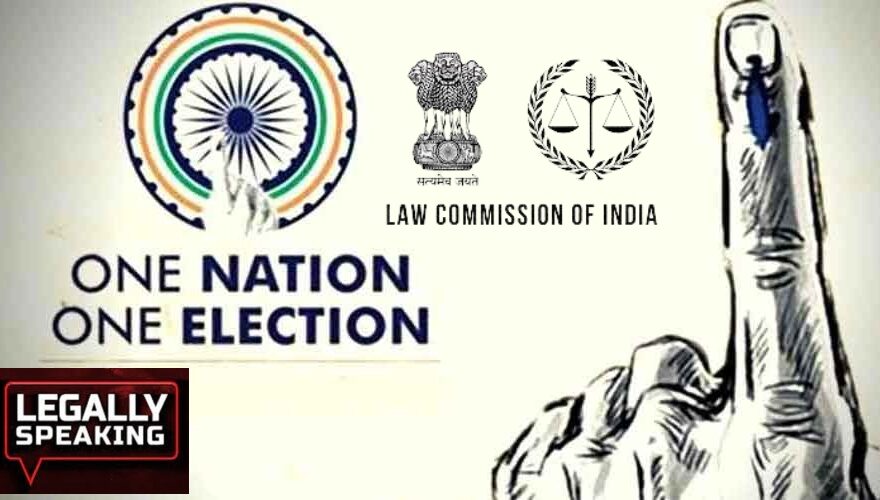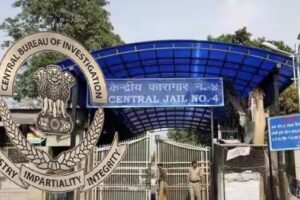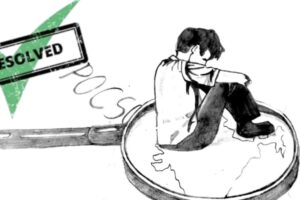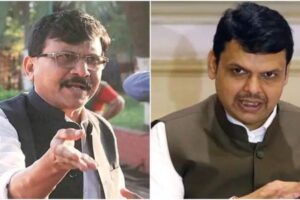
Coming week, the Law Commission is poised to present its report to the Central Government concerning of “one nation , one election.” This anticipated report, led by Justice (retd) Ritu Raj Awasthi, may propose constitutional amendments to facilitate simultaneous Lok Sabha, State Assemblies, and local body elections nationwide by mid-2029, according to insider sources.
The proposed amendments of Law Commission would introduce a new chapter to the Constitution, empowering the synchronization of election cycles and potentially overriding existing provisions related to assembly terms. The envisioned changes aim to streamline electoral processes, including the implementation of common electoral rolls across all tiers of government.
Furthermore, the Commission is considering a phased approach to align the terms of legislative assemblies over the next five years, with the ultimate goal of conducting the first simultaneous elections in May-June 2029, coinciding with the 19th Lok Sabha elections. This strategy entails the reduction of assembly tenures by a few months in the initial phase to facilitate synchronization.
Moreover, to address scenarios such as governmental instability or hung assemblies, the Commission may propose the establishment of a “unity government” comprising representatives from various political factions. Should this arrangement prove ineffective, the Commission may advocate for fresh elections to complete the remaining term of the House.
In parallel, a high-level committee chaired by former President Ram Nath Kovind is exploring complementary changes to the Constitution and existing legal frameworks to enable synchronized elections across all levels of government. It is anticipated that the recommendations of the Law Commission will feature prominently in the committee’s forthcoming report.
Why One Nation, One Election
Elections stand as the bedrock of any thriving democracy, epitomizing its vitality and fairness. Yet, orchestrating seamless and equitable elections in a vast nation like India has consistently posed a formidable challenge. A glance at India’s electoral landscape reveals a perpetual cycle of state or national elections, perpetually keeping the nation in an electoral mode. This perpetual electoral churn not only disrupts administrative functions and policy formulation but also imposes a hefty burden on the national treasury. To alleviate these strains, policymakers have mooted the concept of synchronizing Lok Sabha and state assembly elections.
It’s noteworthy that while the focus is on consolidating Lok Sabha and state assembly elections, elections for Panchayats and Municipalities remain excluded from this initiative.
One Nation, One Election- An Experiment of Past
The notion of one nation , one election isn’t novel; it’s been experimented with in the past. Elections for the Lok Sabha and state assemblies were concurrently held in 1952, 1957, 1962, and 1967. However, this rhythm was disrupted when certain state Legislative Assemblies were dissolved prematurely in 1968–69. Furthermore, the Lok Sabha elections in 1971 were also advanced. Hence, if such synchronized elections were successfully conducted before, what hurdles impede their implementation now?
Some argue that the nation’s burgeoning population makes simultaneous elections unfeasible, while others contend that technological advancements have mitigated resource scarcity concerns. Thus, the plausibility of “one nation , one election” remains up for debate. However, mere conjecture doesn’t validate its significance; a thorough examination of its pros and cons is warranted.
One Nation, one election is Need of the Time
Proponents argue that this initiative is development-centric. Frequent elections trigger recurrent enforcement of the Model Code of Conduct, hindering the government’s ability to enact crucial policies and execute various schemes. Consequently, developmental initiatives suffer. The Model Code of Conduct, designed to ensure electoral fairness, prohibits ruling parties from announcing new projects, launching schemes, or making financial approvals after the Election Commission issues notifications. Synchronizing Lok Sabha and state assembly elections would ensure the Model Code of Conduct’s enforcement for a finite period, facilitating uninterrupted development.
Another argument posits that consolidated elections would alleviate the substantial financial burden associated with repeated polls. The constant escalation in election-related expenses is indicative of its adverse impact on the nation’s economic well-being.
Moreover, proponents assert that synchronized elections would combat black money and corruption. It’s an open secret that political parties and candidates openly deploy black money during elections. While candidates face expenditure limits, political parties operate without financial constraints. Frequent elections offer opportunities for politicians and parties to incite social discord, thereby jeopardizing communal harmony. Simultaneous elections could mitigate such risks.
Additionally, proponents argue that consolidated elections would obviate the need to repeatedly deploy government employees and security forces for election duty, allowing them to focus on their primary responsibilities. The disruption caused to teachers, government employees, police, and security forces during elections adversely impacts their efficacy and disrupts the lives of ordinary citizens.
Important Recommendations for One Nation One Election
– Law Commission can recommend holding Lok Sabha, State Assemblies and local body elections across the country by the middle of the year 2029.
– The Commission will recommend amendments to add a new chapter to the Constitution regarding simultaneous elections.
– The Commission will also recommend synchronizing the terms of Legislative Assemblies in three phases over the next five years.
– After which the first simultaneous elections can be held in May-June 2029.
– At that time the elections for the 19th Lok Sabha are to be held.
– According to sources, the Commission will recommend that the state assemblies can be dealt with in the first phase, for this the duration of the assemblies will have to be reduced by a few months like three or six months.
– Furthermore, if a government falls due to no-confidence or there is a hung House, the Commission will recommend the formation of a “unity government” with representatives from different political parties.
– If the unity government formula does not work, the law panel will recommend fresh elections for the remaining term of the House.





